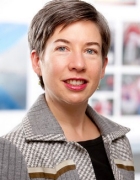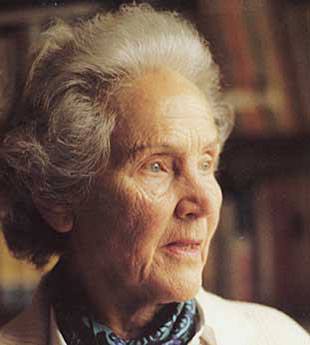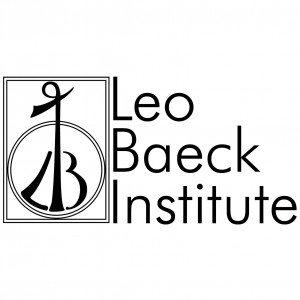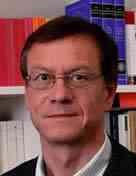Erik Seeman, Director of UB’s Humanities Institute, announced yesterday that GGGAAS member Libby Otto will be the HI’s next Executive Director. Congratulations Libby!
Here’s the article from the UB Reporter:

Dr. Libby Otto
The UB Humanities Institute (HI), the single most important entity supporting the humanities in Western New York since 2005, has announced the appointment of Elizabeth Otto as its new executive director, effective July 1.
Otto, associate professor of visual studies and a scholar of European and American art and visual culture from the 19th century onward, is well-recognized at UB and in her field for her collaborative, interdisciplinary work.
She will replace Carrie Tirado Bramen, professor of English, an award-winning humanities scholar in her own right. Bramen has served as HI executive director since 2006 and will return to her faculty position full time.
“Otto has been a member of the institute’s executive board for several years, which will make the transition smooth,” says institute Director Erik Seeman, professor of American history, with whom Otto will work collaboratively.
“We are fortunate that Libby, who is so well-qualified and enthusiastic, accepted this job,” Seeman says. “She is already very familiar with our operation and programs, and has many new ideas. Her broad and deep intellectual interests embrace several fields of study and areas of interdisciplinary collaboration. This is important because our faculty fellowship program alone has involved scholars from 15 departments.”
Like Bramen, Otto will support and help operate the institute’s existing programs, which include the Faculty Fellows Program and associated HI Fellows Lecture Series, the New Faculty Seminar Series, the Dissertation Fellowship Program, scholar sessions, research workshops and two programs inaugurated by Bramen: the very popular Gray Matter series, which features emeritus members of UB’s humanities’ faculty, and the Scholars in the Schools Program, which brings humanities scholars into Buffalo schools for humanities presentations and discussions.
Otto says she would like to use current initiatives to expand the institute’s work with the Western New York community and find opportunities to collaborate with other area humanities programs.
“I also am very interested in the long-term financial stability of the institute,” she says, “so that will be on my radar as well.”
She points out that one of the principal functions of HI is to foster discussion on the role of the humanities in a changing cultural, intellectual and political landscape, an ongoing conversation in which she says she will be pleased to help provide leadership.
“Another high priority for all of us,” Otto says, “is to secure a larger, permanent home for the institute. The work that we do would be best supported by having more offices and a space together. This would allow fellows, faculty members and graduate students to have impromptu, as well as scheduled exchanges, and would help solidify the institute’s identity on campus and further support its programs and events.”
Seeman says that Bramen, in addition to organizing hundreds of HI-sponsored events and its faculty fellows’ program, “developed, championed and carried forward important university-community humanities initiatives that continue to be part of the institute’s mission.”
He calls Bramen “a warm, welcoming and broad-minded person, open and curious, with wide intellectual interests and a great sense of humor; a person committed to the broader community from the very start.”
“I hate to see her go, but she wants to finish her study on 19th-century American sociality and typologies,” he says. “She can’t do that while teaching and also serve as an integral part of the institute.
“Fortunately,” Seeman says, “Libby Otto has many of the same characteristics as Carrie and will bring them to bear on our work. She has energy, commitment and a good knowledge of the field. I expect to enjoy working with her.”
Otto says she, too, is very much looking forward to her new role.
“One of the most central aspects of the Humanities Institute is that it is agnostic in that it serves no single intellectual focus but will support any collaborative effort among faculty and graduate students,” she says. “In this sense, it is a grassroots scholarly organization that is continuously renewing and reinventing itself. Because of this, HI has supported and helped to produce remarkable work that promotes rich and complex understandings of our world.”
A prolific scholar, Otto is widely published in journals in her field and is currently working on a book, “Haunted Bauhaus: Spirit and Body in the Home of Rationalized Culture,” that challenges the conventional understanding of interwar Europe’s most influential art institution.
She also is co-editor of “The New Woman International: Photographic Representations from the 1870s through the 1960s” (University of Michigan Press, 2011) and author of “Tempo, Tempo! The Bauhaus Photomontages of Marianne Brandt” (The Bauhaus-Archiv and Jovis Verlag, 2005).
Otto has received numerous grants and fellowships, including those from the Alexander von Humboldt Foundation, the American Association of University Women, the Berlin Program for Advanced German and European Studies, the German Academic Exchange Service (DAAD), the University of Pittsburgh’s Humanities Center and the SUNY Conversations in the Disciplines program.
At UB, her awards include a faculty fellowship from the Humanities Institute and a research award from the Gender Institute. Her 2011 “International New Woman” conference was funded in part by a SUNY Conversations in the Disciplines grant.







